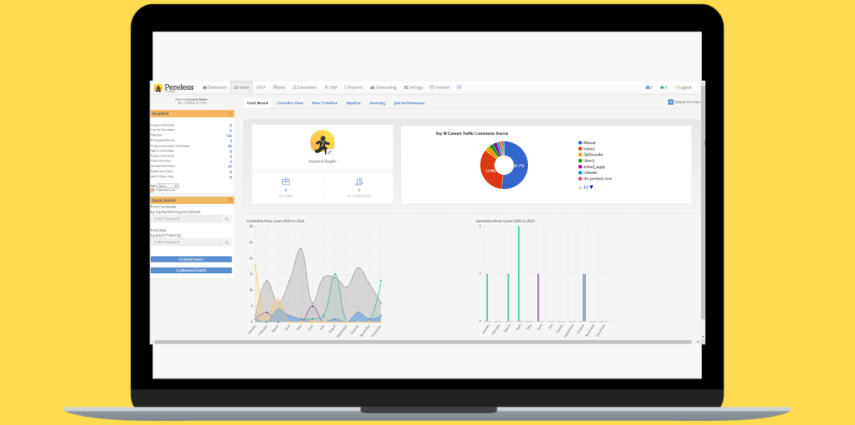In today’s hyper-competitive talent market, selecting the right Applicant Tracking System (ATS) isn’t just about ticking boxes—it’s about future-proofing your hiring process for efficiency, compliance, and candidate delight. With 97.8% of Fortune 500 companies relying on ATS platforms in 2025, the stakes are high. But amid the sea of options, which features truly separate the game-changers from the rest?
This guide breaks down must-have ATS features for 2025, focusing on texting, reference checks, custom application questions, manual candidate adds, scheduling, onboarding, and integrations. Backed by the latest stats—like how ATS adoption has surged to 85% among mid-sized firms for streamlined workflows—we’ll show you why these tools can slash time-to-hire by up to 40% and boost hire quality. Whether you’re a startup or scaling enterprise, prioritizing these ensures your ATS isn’t just software—it’s a strategic powerhouse.
Why ATS Features Matter in 2025: A Quick Stats Snapshot
Before diving in, consider this: 73% of job seekers are passive, waiting for the right nudge, and AI-driven features in modern ATS can increase engagement by 300%. As remote work evolves and Gen Z enters the workforce (preferring mobile-first experiences), your ATS must adapt. Look for platforms with robust analytics and automation—key trends projected to dominate 2025 recruiting.
Now, let’s explore the essentials.
1. Text Recruiting: Instant Engagement for Faster Responses
Gone are the days of email black holes. Text recruiting lets you send personalized SMS alerts directly from your ATS, turning passive candidates into active applicants overnight.
Why It’s a Must-Have
- Speed & Conversion: Texts boast open rates of 98% and responses in under 5 minutes—300% faster than email. In 2025, with candidates glued to phones (averaging 4+ hours daily), this feature reduces no-shows by 40%.
- Personalization at Scale: Automate nudges like “Hey Alex, your skills match our Marketing role—reply YES for details!” while complying with TCPA regulations.
- Pro Tip: Seek ATS with texting in base plans to avoid hidden fees.
Tools like Pereless Systems make this seamless, integrating SMS into your pipeline for effortless candidate nurturing.
2. Automated Reference Checks: Verify Talent Without the Hassle
Reference checks often bottleneck hiring, but integrated automation changes that—requesting, tracking, and compiling feedback in one dashboard.
Key Benefits
- Efficiency Gains: Automate multi-reference requests via email, cutting manual follow-ups by 60% and speeding verification from weeks to days.
- Deeper Insights: Customizable templates capture qualitative data (e.g., “team fit”) alongside ratings, reducing bad hires by 25%.
- Compliance Edge: Built-in audit trails ensure EEOC adherence, vital as DEI scrutiny rises in 2025.
Choose an ATS where references trigger post-interview, blending seamlessly with your workflow.
3. Custom Application Questions: Filter for Culture and Skills Fit
Standard forms miss the mark—custom questions let you tailor screens to reveal if a candidate aligns with your unique needs.
Standout Advantages
- Precision Screening: Ask role-specific queries like “Describe your experience with remote team motivation” to prioritize high-fits, improving quality by 35%.
- Diversity Boost: Include inclusive prompts (e.g., voluntary self-ID) to support equitable hiring, aligning with 2025’s focus on belonging.
- Mobile Optimization: Ensure questions load quickly on phones to cut drop-off rates by 50%.
This feature turns applications into intelligent gates, not generic hurdles.
4. Manual Candidate Addition: Flexibility for Networking Gems
Not every star comes via job boards—manual adds let you import referrals or LinkedIn finds directly into your ATS.
Why It Excels
- Pipeline Enrichment: Bypass ads to add 20-30% more qualified leads from your network, accelerating fills during talent shortages.
- Seamless Integration: Auto-populate profiles from resumes or social data, tagging for easy tracking.
- Hybrid Sourcing: Ideal for 2025’s blend of inbound/outbound recruiting, saving hours on data entry.
Look for bulk upload options to scale this for high-volume teams.
5. Integrated Scheduling: No More Calendar Tetris
Coordinating interviews across time zones? Built-in scheduling syncs with Google/Outlook, proposing slots in real-time.
Transformative Perks
- Time Savings: Reduces back-and-forth by 75%, with self-scheduling links boosting candidate satisfaction.
- Global Readiness: Time-zone auto-adjustments and group polling make remote hiring a breeze.
- Analytics Tie-In: Track no-show patterns to refine outreach.
In a post-pandemic world, this feature is non-negotiable for agile teams.
6. Onboarding Automation: From Offer to Productivity in Days
Hiring ends at onboarding? Not anymore—ATS with digital portals handle paperwork, training, and check-ins pre-Day 1.
Critical Wins
- Retention Lift: Automated e-signatures and task lists cut ramp-up time by 50%, improving first-year retention by 20%.
- Compliance Automation: Embed I-9 forms and policy quizzes for seamless VEVRAA/OFCCP adherence.
- Personalized Journeys: Welcome emails and progress trackers make new hires feel valued from the start.
Seek ATS that extend pipelines to “Onboarded,” closing the loop on your investment.
7. Robust Integrations: The Glue for Your Tech Stack
A siloed ATS is a liability—look for native connections to job boards, background checks, assessments, HRIS, payroll, and video interviewing tools.
Ecosystem Power
- Workflow Harmony: Sync with HR tools for auto-data flow, eliminating double-entry errors by 90%.
- Expansion Potential: API access for custom builds, supporting 2025’s AI trends like chatbots.
- Cost Control: Free tiers for basics (e.g., Indeed syndication) keep scaling affordable.
Prioritize open APIs for long-term flexibility.
What Would Bradford Do? Choose an ATS That Grows With You
In 2025, the best ATS isn’t the flashiest—it’s the one that aligns with your goals, blending these features into a cohesive, user-friendly experience. With adoption rates climbing to 90% globally, now’s the time to audit yours.
Ready to upgrade? Book your demo today and discover how these features can transform your hiring!
Sources:
https://recruitcrm.io/blogs/applicant-tracking-system-statistics/
https://www.jobscan.co/blog/fortune-500-use-applicant-tracking-systems/
https://www.selectsoftwarereviews.com/blog/applicant-tracking-system-statistics
https://www.mokahr.io/myblog/2025-applicant-tracking-system-trends/
https://dishertalent.com/blog/top-applicant-tracking-systems-2025-review/
https://peoplemanagingpeople.com/recruitment/applicant-tracking-system-features/
https://www.peoplehum.com/blog/must-have-applicant-tracking-system-ats-features-for-hr
https://technologyadvice.com/applicant-tracking-systems/









